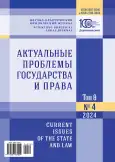On the issue of security as a category in civil law
- Authors: GURULEVA E.A.1, IVANOVA N.A.2
-
Affiliations:
- Russian Presidential Academy of National Economy and Public Administration
- Derzhavin Tambov State University
- Issue: Vol 8, No 4 (2024)
- Pages: 538-545
- Section: Issues of Private and Public Law
- URL: https://journals.rcsi.science/2587-9340/article/view/303580
- ID: 303580
Cite item
Abstract
Mankind, overcoming new stages of its development, along with replenishment of its arsenal with positive achievements of civilization, is forced to face new threats and challenges that encroach on the security of man, society and the state. In this regard, the problems of ensuring various types of security have become particularly relevant. Within the framework of the legal concept, security is considered as the most important social good. Objective: to study security not only as a legal category, but also to determine the doctrinal directions of the study of security as a category in civil law. In the course of the study of the problematic, the method of analysis, etymological analysis, historical, comparative legal, formal legal methods are used. The conducted analysis shows that insufficient attention is paid to the problems of civil law provision of security in the legal literature. Different approaches that have developed as a result of the study of the concept of security, starting with the etymology of the word, are considered. A theoretical and legal study of security as a legal category is carried out, the features of the methodology in the study of security issues in civil law are considered. It is concluded that security is not only a state of protection, but also the possibility of development and the inadmissibility of a threat of increased risk or a risk that is inadmissible under comparable circumstances. It is revealed that the category of “security” is not absolute, but relative and depends on various conditions and circumstances.
Keywords
About the authors
Elvira A. GURULEVA
Russian Presidential Academy of National Economy and Public Administration
Author for correspondence.
Email: guruleva-ea@ranepa.ru
ORCID iD: 0000-0002-3469-2741
Cand. Sci. (Law), Associate Professor, Associate Professor of Civil Law and Procedure Department
Russian Federation, 82 Vernadskogo Ave., Moscow, 119571, Russian FederationNelli A. IVANOVA
Derzhavin Tambov State University
Email: nelli1004@yandex.ru
ORCID iD: 0000-0002-4601-6249
Cand. Sci. (Law), Associate Professor, Head of Civil Law Department
Russian Federation, 33 Internatsionalnaya St., Tambov, 392000, Russian FederationReferences
- Cicero M.T. (1999). About Old Age, about Friendship, about Duties. Moscow, EKSMO-Press Publ., 526 p. (In Russ.)
- Goncharenko L.P. (2005). Security Management. Moscow, Knorus Publ., 272 p. (In Russ.)
- Abramov V.V. (2013). Definition “safety” in the civil law and the legislation. Vestnik Permskogo universiteta. Yuridicheskie nauki = Perm University Herald. Juridical Sciences, no. 4 (22), pp. 111-117. (In Russ.) https://elibrary.ru/rpyaux
- Rodachin V.M. (2024). Philosophy of Security: Encyclopedic Dictionary of Categories, Notions, Concepts, Ideas. St. Petersburg, Naukoemkie tekhnologii Publ., 160 p. (In Russ.)
- Kruzhkov A.P. (2009). Sotsial’no-filosofskie aspekty sozdaniya bezopasnoi sredy. Cand. Sci. (Philosophy) diss. Saransk, 153 p. (In Russ.)
- Vershilov S.A. (2009). Safety in social philosophy. Izvestiya Volgogradskogo gosudarstvennogo pedagogicheskogo universiteta = Ivzestia of the Volgograd State Pedagogical University, no. 8 (42), pp. 59-61. (In Russ.) https://elibrary.ru/lpayyf
- Volkova N.P. (2017). The concept of security in the history of philosophy. Filosofskoe obrazovanie, no. 1 (35), pp. 98-103. (In Russ.) https://elibrary.ru/zbnhxf
- Chernykh P.Ya. (1993). Historical and Etymological Dictionary of the Modern Russian Language. Moscow, Russkii yazyk Publ., 624 p. (In Russ.)
- Bogdanovich A.B., Luts L.N., Novitsky V.V., Sergeev V.N. (2018). On conceptual history of safety. Vestnik Universiteta grazhdanskoi zashchity MChS Belarusi = Journal of Civil Protection, vol. 2, no. 4, pp. 521-532. (In Russ.) https://elibrary.ru/ypmhtn
- Iroshnikov D.V. (2019). Security as a Legal Category. Moscow, 224 p. (In Russ.) https://elibrary.ru/qytzbo
- Mikailov S.M. (2013). National and Property Security: the Relationship between Concepts and Aspects of Providing Non-Departmental Police Security. Moscow, PIN Publ., 296 p. (In Russ.)
- Mikailov S.M. (2014). The sphere of ensuring property security of legal entities and individuals as an object of state regulation. Gumanitarnye, sotsial’no-ekonomicheskie i obshchestvennye nauki = Humanities, Social-Economic and Social Sciences, no. 2, pp. 197-201. (In Russ.) https://elibrary.ru/rxogkj
- Mitrokhin V.I. (1995). National security of Russia. Intellektual’nyi mir, no. 6, pp. 1-20. (In Russ.)
- Rybakov V.A., Iroshnikov D.V. (2017). Civil mechanism for ensuring human security. Yurist = Jurist, no. 2, pp. 4-9. (In Russ.) https://elibrary.ru/xwvvvl
- Klimov O.N. (2003). Natsional’naya bezopasnost’ Rossii v usloviyakh globalizatsii (politologicheskii analiz). Cand. Sci. (Politology) diss. Moscow, 169 p. (In Russ.) https://elibrary.ru/nmhvgf
- Zięba R. (2018). Bezpieczeństwo w ujęciu rożnych paradygmatow naukowych. Bezpieczeństwo. Dyscyplina nauki voobec funkcjonowania państwa. Białystok, Agencja Wydawnicza Ekopress, pp. 13-26. (In Polish).
- Iroshnikov D.V., Pulik A. (2021). Methodological aspects of security research in civil law. Metodologicheskie problemy tsivilisticheskikh issledovanii = Methodological Problems of the Civil Law Researches, no. 3, pp. 364-377. (In Russ.) https://doi.org/10.33397/2619-0559-2021-3-3-364-377, https://elibrary.ru/odddou
- Iroshnikov D.V. (2021). Bezopasnost’ kak pravovaya kategoriya. Dr. Sci. (Law) diss. Moscow, 596 p. (In Russ.)
Supplementary files








